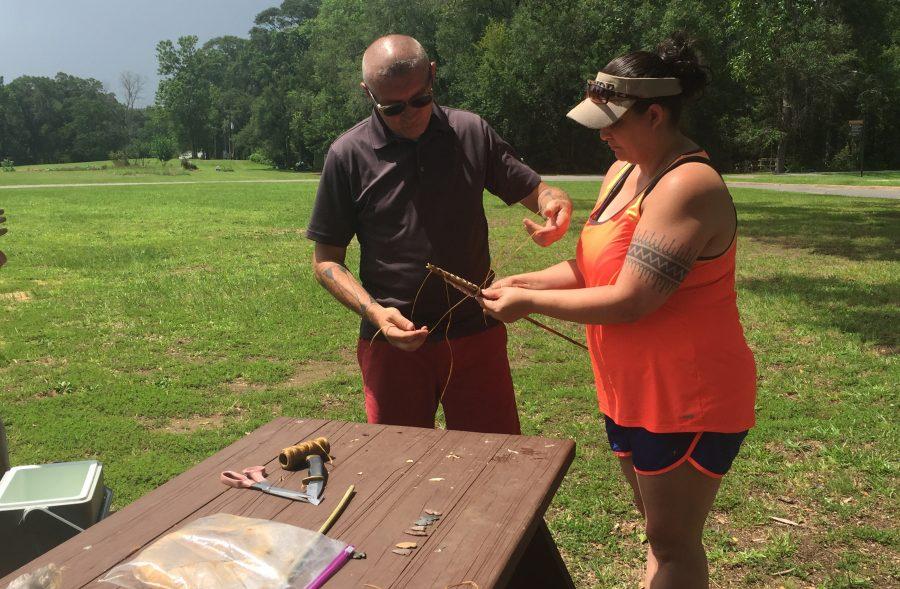As Greg Drowning Bear attaches the turkey feather to the rivercane stick, he tells a small group surrounding a table how he got the feather. It came from a turkey he hunted with the same kind of arrow he’s making right now. He’s been making rivercane arrows for as long as he can remember, he said. A Cherokee, Drowning Bear learned from his father and his grandfather. Now he teaches his son and on Saturday, he brought his skills to Moundville to teach the park’s visitors.
“It’s not something that they can do everyday,” he said. “It’s not something that you can just go and see. You can go to a movie. You can go shopping. You can go to the mall, but this is actually seeing something that is thousands and thousands of years old that people did and still do.”
His demonstration was a part of Moundville Archeological Park’s “Saturday in the Park” series. Each week in June and July, Moundville brings in demonstrators to show native crafts and traditions from 11 a.m. to 3 p.m. Other weekends include flint knapping, pottery demonstrations and this Saturday’s topic, flute making.
It’s something that you’re not going to be able to get anywhere else,” said Kayla Scott, the education outreach coordinator for Moundville. “It’s one thing to be able to go into a museum and see artifacts, but it’s totally a different thing to understand how they were made in the native tradition.”
Drowning Bear, who’s been a Cherokee language instructor at the University of Oklahoma, said that teaching has also been a part of who he is. When he came down to enroll his daughter in Early College at the University of Alabama, he visited Moundville, met some of the staff and was invited to be a demonstrator in the series.
For him, he said, it’s about fighting the stigma that Native American traditions like rivercane arrow making no longer exist.
“There’s a lot of things that the general public doesn’t know that we still do,” he said. “We still utilize these. We have fun with them. We still make canoes. I made a dug-out canoe with my son a few years back and after watching people go ‘Well you know the native people used to do that.’ I just want to continue that on, and I want that to continue and I want my son to continue it on and perpetuate our culture and language.”
Lisa Rasco, an education assistant at Moundville, said that many demonstrators for “Saturday in the Park” were found through conversations with visitors to the park. To her, the most interesting part of the series is seeing that there’s a natural way to live and create things that doesn’t require modern technology.
“If you have the knowledge, you’ll know why we’re so adamant about preserving the site and taking care of the site, because it’s history,” she said. “It would be like destroying a piece of history if it was not here, and the more we can bring the public in, giving them extras, more than just ‘Come in and climb a mound,’ but having demonstrators here to show I think it really exposes how much this park has to offer.”
“Saturday in the Park” is held weekly at Moundville Archeological Park from 11 a.m. to 3 p.m. The demonstrations are free with general admission and are held in front of, or inside, the Jones Archeological Museum. Admission is $6 for students and children and $8 for adults.









